
Comments are available here.
I love the word durdle because it sounds like its meaning.
Durdle. Durdle. Durdle.
As with any word, it can have multiple meanings. It is hard to find a concrete definition since the word is often used as slang. One definition: taking a long time doing an action or set of actions and accomplishing nothing. Another definition specifically is used for games like Magic: a person who takes a long time to complete a very simple task, generally during online games or card games. Today, I am going to talk about the importance of durdle in the metagame, play, and deck construction.
Durdle in Magic
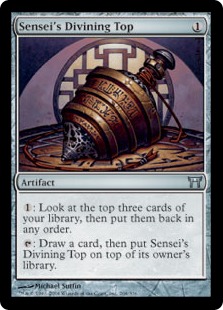
Durdle. Durdle. Durdle.
All tutors and pure card draw, looting and scrying also fall into the durdle camp. Keep in mind, the term isn’t negating the importance or tutoring, resource management or card advantage. However, casting Demonic Tutor on turn two doesn’t affect the game till the following turn. A person can even make a series of plays that are durdlish. I’ve seen players go bonkers with Skullclamp on the battlefield. They spend a bunch of mana and throw away a bunch of creatures to net a card or two. They spent a lot of resources for meager gains.
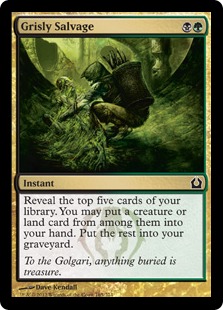
Is durdle bad? It’s not necessarily a bad thing. It can be a very good thing. Durdle can add consistency. Using Sensei’s Diving Top to prevent Dark Confidant damage has its benefits. The problem is it is slower. It is speed versus consistency. I don’t think there is a player out there who will put down their Brainstorms or Ponders cause it makes their deck slower. The important take-away is to know its place.
Durdle in the Metagame
I don’t get to play as much competitive Magic as I would like. Twins, two jobs, and other responsibilities keep me busy. However, I still keep an eye on the metagame for most formats except Vintage. It is akin to watching the stock market. I have always believed the speed of the format is important especially for durdle. In a fast format, a player doesn’t have time to durdle. In a slower format, there is more time to durdle. I believe a healthy format should be on the fence with some ebb and flow.
A past example was the Standard environment around Zendikar. To paint a picture, the environment was originally very fast. Fast white/red aggro (Boros Bushwhacker) decks were rampant. As the metagame evolved, blue/white decks took over by adapting cards like Wall of Omens. Eventually, the whole metagame became a lot of control decks. Now, to beat the other control decks, those decks became more durdly with more card draw and etc. I thought to myself at the time; the environment is ripe for a return of red/white aggro. Guess what? The next Pro Tour (in China if I recall correctly) was taken down by Boros Bushwhacker.
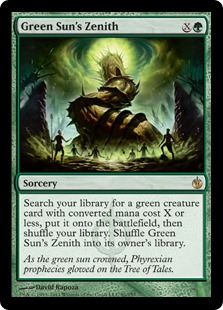
If we look at the Modern environment, there is very little durdle amongst the archetypes. Durdle too much and a person is dead. What about Birthing Pod? It is has some durdle qualities, but it also moves the game forward with its plays. Here the durdling/not-durdling categories fall apart, because Magic is a complicated game. But in general, Modern has a shortage of durdle.
Durdly Plays
Players don’t normally look at cards like Divination as skipping their turn. They only see the card advantage. Imagine if the card said the following: Draw two cards and skip your turn. Skipping a turn is often ignored because the card advantage is often what wins games. However, I’ve seen many Commander players lose the game because they get greedy. They get a Skullclamp active and go nuts drawing cards. As soon as the turn is passed, some other player just kills them. The scene of Indiana Jones pulling out his gun to shoot the showoff of a swordsman from the Raiders of the Lost Ark comes to mind.
Durdle isn’t necessarily a bad thing. Modern Tron decks are a case in point. They win because all that durdling leads to some very powerful plays. Modern Pod decks are also very durdly, but progresses the game state while they work to some degree. Knowing when and why durdling is important is key. Former Standard decks of Innistrad and Ravnica used Grisly Salvage/Mulch to reanimate some very powerful creatures with Unburial Rites. Thragtusk negated a lot of the damage an opponent had done during those lost turns.
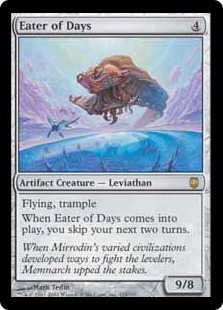
It is all about perspective. I do think it's important to look at cards this way. It reinforces the sacrifices we make to play such cards like Living Wish. Love the card - it has great versatility and adds consistency. The big but is that it negates an entire turn. I could have played a Tarmogoyf, but instead I decided to skip an entire turn. All I hope is that next time you look at such cards, you see that small print at the bottom that says: skip a turn.
Deck Building with Durdle
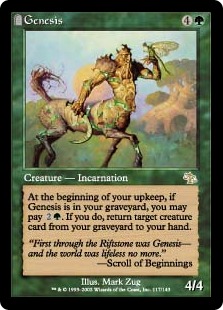
Once there is pressure on an opponent, one can durdle away. It comes down Mike Flores’s concept of understanding “Who's the Beatdown”. New players like to define it as deck types when in reality every deck ebbs and flows from control to aggro and back again. The popular Black Devotion decks in Standard do this a lot. Spot removal plays control while creatures maintain aggression. The key to playing any of these decks is knowing when applying pressure is more important than controlling the board state. When at an advantage, a player has the luxury of casting Underworld Connections to help seal the game. When the opponent has the upper-hand, it is often more important to go on the defense by eliminating threats.
When building a deck, it is vital to understand where those durdly cards fall. If a deck has early aggressive turns, the durdle plays should be on the back end of the curve optimally. On the other hand, a deck with big plays can afford to durdle in those first few turns. Does it matter how much a player durdles in those first few turns when Supreme Verdict is going to wipe the table clean? It comes down to the sequence in which a deck plays and knowing where you want those durdly cards to fall in that sequence.
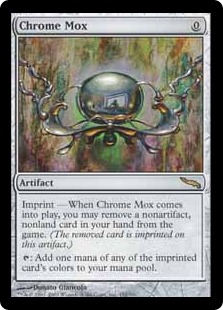
Let’s look at Legacy at the moment. The format is very, very fast in the current metagame. It is very plausible to lose turn two (sometimes even turn one) to a storm deck. A thorn in many decks in the format is a card like Thalia, Guardian of Thraben. Many of the decks that play her sport Aether Vial. While it is a very powerful card, the artifact is often a turn too slow. If those players had been playing a Chrome Mox or other fast mana, Thalia could have hit the table turn one. Yes, it card disadvantage, but at least you didn’t lose the game, and that's what's important. Aether Vial is actually a durdly card. It can prove very powerful, but is that what you really need to survive?
I understand there are holes to my Chrome Mox motto. There are times when a Swords to Plowshares sits in hand dead when playing against a noncreature combo deck. Next time when you lose a game, look at the cards in your hand. How many cards do you have in hand? How many lands are in play? I just want you to contemplate it. Would an extra land have allowed you to play an extra spell? Are there big spells stuck in your hand that you couldn’t play because your opponent had already killed you? It is just something to contemplate.
Durdle. Durdle. Durdle
Physics professors love talking about work. Technically, if you moved an object around all day to only bring it back to its original position, you didn’t do any work. You did nothing. In a sense, that is what I am talking about in terms of durdle. I mention it because Magic players seem to love their physics analogies. At the end of this article, I just hope you take a second look at your play and deck building. Too often I see players spinning their wheels. They feel like they are doing something. They think tapping lands and playing a bunch of permanents is winning the game. In reality, they are doing a whole lot of nothing.
Later,
Meyou
Comments